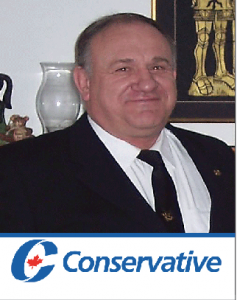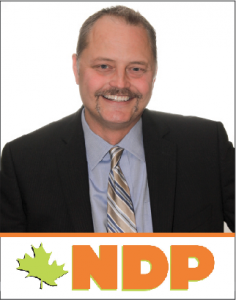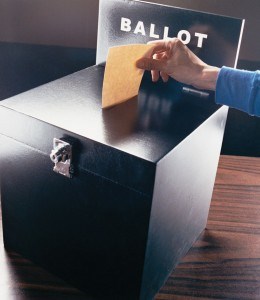With less than a week before the federal election, Yellowhead candidates are making a final push for your vote on Oct. 19. To help you make an informed choice, the Fitzhugh has published a series of questions and answers from each candidate. This week the questions focus on temporary foreign workers and climate change.
The candidates' responses are printed verbatim. Sandra Wolf Lange, the Yellowhead candidate for the Green Party, did not responded to repeat requests for answers.
 Ryan Maguhn
Ryan Maguhn
In 2014, the federal government made sweeping changes to the temporary foreign worker program. Since then, the labour shortage in Jasper has become more acute as businesses struggle to attract and retain unskilled labour. How will your party help local businesses meet their labour needs?
The Liberal Party is interested in ensuring that our local businesses are given the tools necessary to continue to offer high quality services in our communities. We know that the Conservative government's actions (or rather, inactions) crippled that ability in 2013.
A program dealing with labor shortages must have a two pronged approach. First of all the government must ensure that a program to encourage internal migration exists within the country. Tax incentives for both workers and businesses can be utilized to see Canadians move from areas of high unemployment to areas of high worker needs; especially in terms of skilled labor.
Clearly this will not address all of our service sector needs, but it will promote a reduction in unemployment in Canada first.
Secondly, the program must include a way for businesses to utilize temporary foreign workers when no other solutions can be found within a reasonable timeframe. This program must be transparent, streamlined and efficient to ensure that our local economies do not suffer (as they have).
Lastly, it is essential that as we look towards future immigration (as all parties have acknowledged this is essential to Canada's future); we offer our temporary foreign workers an express citizenship option; thereby promoting them to lay down roots and contribute to local economics. These are people who are already in our communities, contributing to our economies and well on their way to becoming Canadian...we should reward that work ethic with the opportunity for citizenship.
This summer, Alberta faced one of its worst fire seasons on record. It is also in the midst of one of the worst droughts in its history, leading the province to declare an agricultural disaster. At the end of November, 190 countries around the world will gather in Paris to work on a new agreement on climate change. How will your party reduce Canada's greenhouse gas emissions to mitigate the consequences of climate change?
The first step in dealing with any problem is to first identify that there is one. The Conservative government has a track record of shuffling responsibility, stepping out of international agreements and outright fighting science in terms of climate change.
This approach has actually hurt our economic opportunities—as other nations, like the United States, will not collaborate with us (on pipelines and transport) until we collectively work to become better stewards for the environment.
A Liberal Government will see leadership both Federally and Provincially united in attendance in Paris, with a guarantee to meet within 90 days of returning for the purposes of establishing a framework to reduce our carbon emissions. We are also dedicated to coming to the table with both the United States and Mexico to work on a multilateral clean energy and environment agreement.
What we’re talking about is ethical leadership in terms of climate change. Additionally we are determined to take the climate crisis and turn it into opportunity. Our platform demonstrates a commitment to investing in economic diversification in terms of green (clean) tech, which represents an industry well over $310 billion.
We need a government that is willing to act now, in ensuring opportunities exist for businesses in Canada to put people to work, while grabbing a larger piece of that particular world market. We can benefit through a Liberal
Platform on environment and the economy, without sacrificing either; instead we will capitalize on the crisis we face...ultimately building a stronger Canada.
 Jim Eglinski
Jim Eglinski
In 2014, the federal government made sweeping changes to the temporary foreign worker program. Since then, the labour shortage in Jasper has become more acute as businesses struggle to attract and retain unskilled labour. How will your party help local businesses meet their labour needs?
Changes were made in 2014 by our government because of a number of highly publicized cases involving allegations that employers were abusing the program. Temporary Foreign Workers in Canada increased threefold in the last decade and fivefold in Alberta.
Our government is aware of sector specific regions in Canada and is prepared to work with Provinces, Regions, Communities and Industry to address the issues. For example, Seasonal Agriculture Workers Program and Live-In Caregivers. Temporary foreign workers who are hired for specific trades and brought in, and/or sponsored by an employer, must have the skills required as well as prove their qualifications to our Immigration Department before they are allowed into Canada.
Jasper’s needs are well known as are many other community’s and region’s across the country. We are prepared to make changes; but it is not only our responsibility, the Provinces, the Communities, the Industries must work together and prepare Labour Market Impact Assessments.
James Beckmann in the Fitzhugh hit the nail on the head in his July Letter to The Editor when he said we need to lobby the government to show cause to prove need.
Our country realized that corporations, companies, industries, were abusing the system and that is why we took measures in 2014 to put a halt to this and protect jobs for Canadians. In 2014, 30 per cent were foreign workers, in 2015, it will go down to 20 per cent and in 2016, down to 10 per cent.
Our government relies on the trades and provinces to ensure that people filling the jobs are qualified. If there is an abuse, people have a right to complain and this should be investigated by the appropriate agencies.
Canadians must have first crack at available jobs. Our Government will not allow employers to hire temporary foreign workers while leaving Canadians without jobs.
I personally will work with you to bring your concerns and needs to Citizenship and Immigration Canada and Employment and Social Development Canada.
“Individually we cannot make change – United we can cause change.”
This summer, Alberta faced one of its worst fire seasons on record. It is also in the midst of one of the worst droughts in its history, leading the province to declare an agricultural disaster. At the end of November, 190 countries around the world will gather in Paris to work on a new agreement on climate change. How will your party reduce Canada's greenhouse gas emissions to mitigate the consequences of climate change?
On May 15, 2015, Minister Leona Aglukkaq announced that Canada plans to reduce its greenhouse gas (GHG) emissions by 30 per cent below 2005 levels by 2030. This is a timeframe that requires action now, rather than simply leaving the task to our children.
Canada’s target is a fair and ambitious commitment in line with other major industrialized countries and reflects our national circumstances, including our position as a world leader in clean-electricity generation. This commitment demonstrates our continued leadership on the international stage and at home.
Our Government has been implementing a responsible sector-by-sector regulatory approach and investing significantly in innovative clean energy. Today, Canada has one of the cleanest electricity systems in the world—with nearly 80 per cent of our energy coming from sources that emit no greenhouse gases, whereas the G7 average remains at just 38 per cent.
We also recently announced that we intend to develop regulations to reduce methane emissions from the oil-and-gas sector; increase the efficiency of natural gas-fired electricity plants; and limit emissions from the production of chemicals and fertilizers.
 Ken Kuzminski
Ken Kuzminski
In 2014, the federal government made sweeping changes to the temporary foreign worker program. Since then, the labour shortage in Jasper has become more acute as businesses struggle to attract and retain unskilled labour. How will your party help local businesses meet their labour needs?
As the past president of the Jasper Park Chamber of Commerce, I have been quite familiar with how the Conservatives have not just fumbled but dropped the ball on this. I have also got to know many people that have come through the [Temporary Foreign Worker program], whom have become permanent residence and have become friends.
Canadians are not lazy. Businesses in our community are not lazy either.
As your Member of Parliament, I will work with the community to implement a system that can meet the labour needs. In discussion with local businesses that use the current system, I have heard many ideas that are worth pursuing to meet that goal. The system has to be responsive, and collaborative with businesses, to fill vacancies so that businesses can succeed.
This summer, Alberta faced one of its worst fire seasons on record. It is also in the midst of one of the worst droughts in its history, leading the province to declare an agricultural disaster. At the end of November, 190 countries around the world will gather in Paris to work on a new agreement on climate change. How will your party reduce Canada's greenhouse gas emissions to mitigate the consequences of climate change?
The provinces have moved forward on climate change without the Federal Government. An NDP government will work with the provinces for a national approach. The provinces have a varied approach, from cap and trade to pricing carbon. It is time the Canadian Government join the international community in tackling this problem and meet our climate obligations by building a clean economy.
Climate change demands leadership. But Canadians can’t trust the Conservatives to act. Stephen Harper withdrew Canada from Kyoto. And while other industrialized countries are on track to meet their emissions reduction targets, Canada has fallen to dead last. Instead, the Conservatives have handed billions in subsidies to their friends in the fossil fuel industry. And like Harper, Justin Trudeau has said no to a federal target for reducing carbon emissions.
Tom Mulcair’s NDP will:
- Meet our climate obligations by building a clean economy.
- Eliminate the subsidies to the fossil fuel industry.
- Invest in transit to help cities reduce emissions.
- Show up at the Paris climate meeting with targets and a plan.
- Implement a cap-and-trade system that puts a price on carbon.
 Cory Lystang
Cory Lystang
In 2014, the federal government made sweeping changes to the temporary foreign worker program. Since then, the labour shortage in Jasper has become more acute as businesses struggle to attract and retain unskilled labour. How will your party help local businesses meet their labour needs?
We don’t necessarily support the TFW program but firmly believe that properly supervised immigration is the key to growing an economy. We will streamline the immigration process giving immigrants, who will be productive Canadians, easier access to the Canadian labour market.
An example of how this would work is a sponsorship program where an individual or an employer will vouch for a specific immigrant so that they will have a job and the means to live here as a productive member of our society.
This summer, Alberta faced one of its worst fire seasons on record. It is also in the midst of one of the worst droughts in its history, leading the province to declare an agricultural disaster. At the end of November, 190 countries around the world will gather in Paris to work on a new agreement on climate change. How will your party reduce Canada's greenhouse gas emissions to mitigate the consequences of climate change?
There exists a strong historical link between property rights and environmental stewardship, but in contemporary Canada, this link has been broken, resulting in gross negligence in both.
The Libertarian Party supports redefining this link to match the realities of today. To do so, the Libertarian Party supports the entrenchment of property rights into the Canadian Constitution, including mineral rights. This also means that the Expropriation Act would be repealed to protect property owners from eminent domain.
Furthermore, the Libertarian Party would work towards implementing a streamlined and equitable judicial system that applies tort law to both individuals and companies that contribute to damaging the environment through negative environmental externalities, such as air pollution, water pollution, and soil erosion.
The current environmental regulatory regime is outdated and flawed. Not only do these regulations fall behind consistently in adapting to industry changes, these thousands of pages of regulatory legislation open the door to rent-seeking by crony capitalists, disproportionately harming small businesses across Canada.
The Libertarian Party agrees that negative environmental externalities should not be ignored.
The Libertarian Party of Canada fully recognizes the reality of environmental damage and degradation, as well as the challenges associated with it. Unlike the other political parties, the Libertarian Party seeks to address climate change through market-based policies, as opposed to the flawed environmental regulations of the past several decades.
While the Libertarian Party would work with provincial governments regarding the development of full-cost accounting systems, they would also allow provincial governments to address their environmental concerns in their own unique way. In order to allow for greater provincial autonomy regarding their distinctive issues, a Libertarian government would grant provinces jurisdiction over environment, fisheries, forestry, natural resources, and various other domains that the federal government currently holds.

Voters to cast their ballots Oct. 19
After one of the longest election campaigns in Canadian history, voters will finally get to cast their ballot Oct. 19.
If you didn't already vote during the advanced polls, you can do so at the Jasper Activity Centre from 7:30 a.m. to 7:30 p.m. on election day.
In order to vote, you need to be a Canadian citizen, at least 18 years old on election day and be able to prove your identity and address.
For those who registered online before Oct. 13, you should have received a voter information card in the mail. Bring it with you to avoid delays at the polls, however note that your voter information card is not a piece of ID.
For those who forgot to register or did not receive a voter information card in the mail, don't fret you can still vote. There are three ways you can cast a ballet on election day.
The easiest way to prove your identity and address is to show up at the poll with your driver’s license, provincial ID card or any other government card that has your photo, name and your current home address.
This will allow you to register or update your information so you can vote.
In Jasper, like many other rural ridings, government ID cards do not usually include a home address.
To get around this issue, bring two pieces of ID on election day. One of the pieces, such as a utility bill, bank statement or vehicle ownership, must include your current address. To see the full list of acceptable ID, visit www.elections.ca.
The most important thing is that one of the pieces must include your name and physical address and not just a post office box number.
If none of your pieces of ID have your physical address, you can still vote by taking an oath.
To do that, you will need to bring two pieces of ID with your name and have someone who knows you attest to your address. This person must show proof of their identity and address and be registered in the same polling division. They can only attest for one person.
For more information about the voting process, visit Elections Canada's website at www.elections.ca or call the Elections Canada office in Hinton at 1-866-720-2250.
Paul Clarke
[email protected]
